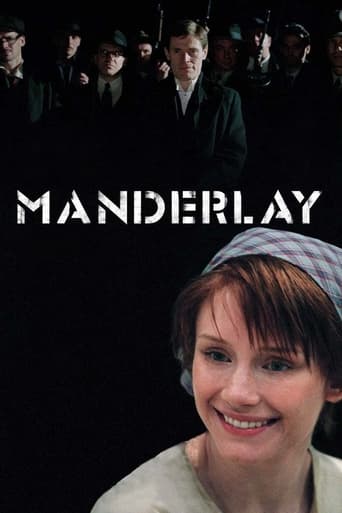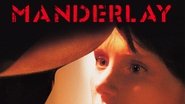WubsTheFadger
Short and Simple Review by WubsTheFadgerManderlay is the sequel to the amazing experimental film Dogville.
Manderlay takes place right after Dogville and is about a town were slavery is not abolished. The story is at best okay. I found it too political and how it made it seem like white people owed blacks something. The film had too much white guilt over slavery scenes. I did find the ending very good because it made Grace realize that Dogville and Manderlay are both places where good people don't exist. All of the actors from Dogville were replaced in Manderlay which is one of the worst aspects of the film. Bryce Dallas Howard is no where near Nicole Kidman and this is the worst part of the film. Bryce Dallas Howard is shown nude. She is shown full frontal. Her breasts, though they are small, and orange pubic hair can be seen very clearly. There is also a scene where she spreads her legs and her vulva can be seen for a split second.The pacing is slow but Lars does this in order to develop the characters and the story. The runtime is nonetheless overlong.Pros: Good experimental film, an okay story, good ending, seeing Bryce Dallas Howard nude, and slow pacing that develops the characters and storyCons: Way too political, all the actors were replaced, some of the pacing is too slow, and an overlong runtimeOverall Rating: 7.3
Imdbidia
Manderlay is the second installment of Lars Von Trier's thought-provoking trilogy USA - Land of Opportunities. The story, told in eight episodes, starts where Dogville ended. Grace, her father, and their bunch of gangsters stop to eat by a place in Alabama called Manderlay Plantation, where slavery persists 70 years after its Abolition. Idealistic Grace decides to stay, free the blacks and start a communal free plantation.The setting, like in Dogville, is a theatrical set with minimalist elements of architecture and floor drawings marking the different areas of the place. The camera wanders both very close to the characters, as if the viewer was filming them with their own video-camera, but also from above, from bird's view, as if all they were little pieces in a chess table or little dolls. The setting serves the viewer to focus on the story and its message.Trier is always merciless depicting the human being and Society, not because he is nasty or weird, but because it an artist' obligation -or it should be, because that's the matter of Art- to reflect on the issues that affect the world we live in. You like it or not, Trier is a true artist. In fact, Manderlay's story, is indeed relevant to contemporary Western society.Three main questions are explored and answered in Manderlay and explicitly posed to the viewer through the events told in the movie: 1/ Is democracy the best political system to have a free society? 2/ Can democracy be preached by using the support of guns? 3/ What is the best solution to the race problem in America, both in the past and in the present? Thus, Grace teaches the blacks the rudiments of democracy, but does so as she is escorted and supported by a bunch of gangsters, therefore, from a position of power and of white superior - the same she believes she's fighting against. Moreover, nobody has elected her, so she shouldn't be preaching democracy. If this wasn't enough, Grace tries -always with the best intention, to teach blacks people how to be black and be free without even asking them what they want, she who is not black and has never been a Slave. Actually, she was a sort of slave in Dogville, but she did not learn from that. The shock that she gets at the end of the movie masterly reflects how a just system can be unjust and oppressive when imposed on people who don't benefit from it and have had no voice in its establishment.There is not blinder/deaf person that the one who doesn't want to see/hear. The little moral of the story is mentioned at the beginning, when Grace's father reminds her of her childhood and the bird she had in a cage, which she freed thinking that it was the best thing for it, but not being a wild bird, she found it frozen in the window next day. And, once again, she would treat the blacks with affection and love, but also as if she was her owner.The actors are all good in their respective roles. Bryce Dallas Howard is good as Grace Margaret Mulligan; she looks very sweet and innocent, which helps to convey the naivety and paternalism of her character; however, I found her a little bland sometimes, To be honest, I would have liked seeing Nicole Kidman, as she still looks fragile and naive, but she has a maturity that would have given an extra push to the character; however, I don't think that frigid Nicky would have been good enough in the sex scene. Also very convincing are Isaach De Bankolé as the proud and feisty Timothy, Danny Glover as Wise Elder Wilhelm, and Mona Hammond as lovely but week Old Wilma. However, all the cast is terrific.The music is terrific as well as the last song by David Bowie, Young Americans, which is really relevant to the story, as well as the photos of the America that would have waited for the Manderlay blacks until well entered the 1970s.The main flaws of the film are that the story can be easily twisted if interpreted literally to say that the movie supports slavery or that puts the blame on the blacks for not freeing themselves earlier, which is completely the opposite of what the films intends. The movie, moreover, is not engaging enough at the beginning and a little bit of footage could have been cut. Finally, the colors and quality of the film used are very poor, which really makes the watching not as enjoyable as it could have been. Trier was much more careful in Dogville and had better colors, lightening and a sharper contrast.A very good film, not always engaging.
Framescourer
It's Dogville again but with tweaks - cast, plot... Bryce Dallas Howard is Grace this time around, breaking with her father in a fit of blind righteousness: in the end she's the victim of more curdled Southern reality. This is stupid animal of a film, slow and obvious but feral and honest. I didn't get on with it at all. I think that the script is wooden and delivered with too much reverence (with the exception/relief of John Hurt's narration). It's also badly lit and claustraphobically shot with no good aesthetic reason - another, detrimental change from Dogville.Bryce Dallas Howard is an interesting casting change from Kidman. She manages the transition from wisegirl to denuded (in both senses) naif rather well, although von Trier relies more on her pale youth than her own communicating ability to achieve this. Danny Glover is a little at sea, to be honest; the only character I felt really had an impact was the scowling but inscrutable Timonthy of Isaach De Bankolé. But by the time he'd begun to register, I stopped caring. 2/10
Niklas Pivic
Where "Crash" exposed prejudice at the human core, this film does the very same but works at an entirely different level. von Trier lets the viewer pick battles, stand-points and interests from a very big platter, while "Crash" serves tidbits. "Manderlay" succeeds because of a very simple moral story, where Grace continues from "Dogville", the first film in this series of two, and reaches a villa where a white woman rules negro servants despite the American civil war being over since 70 years. She takes self-manufactured responsibility for paying back what "our people did to yours", and does indeed pay. This film is multi-faceted, arty in the best sense and little things like the shots of humor through John Hurt's narration and the impeccable barrage of pictures at the end to that music are brilliant. Symbolism is key. Highly recommendable film.





